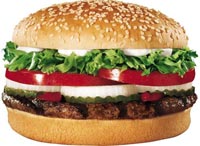
A reader accused me of excess political correctness for saying that I adored Burger King’s Whopper Virgins campaign for its ingenuity, but abhorred it for its nutritional irresponsibility.
Well, it seems that I’m no longer in the politically correct camp as I am absolutely loving BK’s Whopper Sacrifice Facebook application, a widget that rewards users with a free Whopper for every 10 Facebook friends they de-friend.
“What would you do for a free Whopper?,” asks the Whopper Sacrifice Facebook page. “Would you insult an elected official? Would you do a naked handstand? Would you go so far as to turn your back on friendship?
“Install Whopper Sacrifice on your Facebook profile and we’ll reward you with a free flame-broiled Whopper Sandwich when you sacrifice 10 of your friends.”
I’m not sure when Burger King became an armchair anthropologist/sociologist, but I’m kind of enjoying this 21st century version of “What would you do for a Klondike Bar?” And who couldn’t love the snicker-inducing one-two punch of campaign names–Whopper Virgins, Whopper Sacrifice–that recall virgin sacrifices of mythology. (Or maybe just Vestal Virgins tending the flame-broiling fires of the burger wars?)
However, Duncan Riley over at The Inquistr disagrees, finding the application “crass and lame”: “Yeah, because snubbing 10 people makes for a great burger promotion,” Riley laments, calling it as distasteful as the company’s food.
Breaking social ties for food is not unheard of during hard times and in this challenging economic environment 74,674 monthly active Facebook users have taken up the offer, whether for free feasting or simply for fun.
But, as silly as it may seem to non-networking folk, the anti-social implications of the “sacrifice” application is causing much consternation among netizens and negativity toward the company. One friend of mine responded to the campaign by equating the fast food giant with the Devil himself, saying, “Burger King does seem to be taking on the role of Anti-Christ.”
Melinda, a poster in the “Wall” section of the application’s Facebook page, determined the app to be “cruel” and seemed seriously disturbed by the fact that when she de-friended her husband, he really was removed from her list of friends. (Gasp! An application that actually does what it says it will.) She had assumed “it was a hypothetical sacrifice” and was just happy that she had only de-friended her husband since she could easily let him know that she didn’t really mean to de-friend him. Otherwise, her post implied, she would have been committing some serious social networking faux pas.
So, what’s with all the emotion behind the beef? I keep turning back to new magazines in the 90s identifying the trend of 20-and-30-something people in cities who, like the characters on “Seinfeld” and “Friends,” were closer to their pals than to their own families. Thanks to their real families being broken up by such events as divorce and remarriage, academic and or/economic migration, these young people came to treat/regard their circle of friends, broadly defined, as their “family.” And Facebook is all about being “friended.”
As one non-virtual friend of mine suggested, “Maybe people are offended by the implication/suspicion/fear that their supposed friends, ‘BFF’ instant messages notwithstanding, are just a couple of clicks away from not being their friends anymore?” Replace the word “friends” with “family,” and couple it with recent studies showing that Facebook/texting interactions resemble face-to-face interactions, and de-friending for a free burger becomes a much harsher action.
“Many bloggers are shocked that Burger King would launch an application that doesn’t make friends, but instead creates potential enemies,” explains Josh Neiman over at Marketing Breakdown.
But Neiman feels they are taking the King’s antics way too seriously, and I have to agree, by pointing out that “Facebook users have plenty of pseudo-friends and are easily able to remove ‘friends’ without damaging any real/online relationships, this is simply a funny way of cleaning up a friend’s list.”
What do you think: Is Burger King a Machiavellian monarch or simply the court jester?


